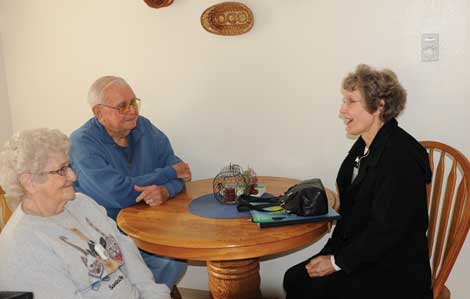In Pierce County, older adults and adults with disabilities have a resource to help them remain in their own homes as long as possible.
The goal of Aging and Disability Resources (ADR), a program of Pierce County Community Connections, is to connect adults and their caregivers with all the resources available to help them achieve that goal.
Aaron Van Valkenburg, manager of ADR, said, “Most if not all of our programs have a tie to helping individuals stay at home and to live in their own home with as many choices, dignity and respect as possible.”
The best place to start, said Van Valkenburg, is a phone call to ADR at 253-798-4600. “That is the starting point for everything, and the call center is open to anyone,” he said.
Calls are answered by a case manager who will start the process of connecting clients with those all-important services, covering everything from where the nearest senior center is located to discussing eligibility with someone who has a complicated issue. Eligibility for services is determined through a home visit where options and referrals are discussed.
“We certainly don’t aspire to do everything, and we rely heavily on good community partners that we can refer people to. ADR is not a one-stop service. It is just the first stop and the front door to a lot of other services,” said Van Valkenburg, adding that the state of Washington has been very forward-thinking on these issues and provides funding for some services. Medicaid, a mix of state and federal funds, and the Federal Older Americans Act also provide funding, as does Pierce County’s general fund, which is used to support senior centers.
“Studies that the state has done on the program found that the family caregiver support program does help reduce the burden levels because we assess every six months and delays formal placement or transition to Medicaid services for the loved one who is receiving the care,” Von Valkenburg said.
Connie Kline, ADR social service supervisor, said many services are provided in-house with case management staff, as well as contracts with community-based organizations providing other services.
“Case managers go out and screen and assess to see what the caregiver’s needs are. The primary eligibility for this program is that it has to be an unpaid, informal caregiver, relative or close friend providing unpaid, full-time care,” she said.
Kline noted the goal is to keep loved ones at home as long as possible.
Services can range from respite care, giving caregivers a much-needed break from their responsibilities, counseling or equipment to assist the caregiver. Other services include foot and dental care and in-home assistance, just to name a few.
Van Valkenburg said the conditions of some clients living at home are every bit as complex as folks in nursing facilities.
“We have people receiving several hundred hours a month of care, and some clients have full-time help,” he said.
Lisa Troyer is a case manager with the Family Caregiver Support Program (FCSP), and as such meets with caregivers to assist them.
“We use a Personal Family Caregiver Survey to help with this process. The results of the survey help in developing a care plan that provides the needed support offered through FCSP,” said Troyer.
This support can come in the form of in-home or out-of-home respite care, education and information, and help with the purchase of adaptive medical equipment. Caregiver counseling and support groups are also available.
Troyer and enjoys the interaction with her clients.
“On a typical day, I drive home thinking how the small amount of help provided by the FCSP makes such a big difference in the lives of the caregivers we serve. It is a blessing to work with such loving and dedicated individuals,” she said.
There are times, however, when in-home care doesn’t work any longer, and at that point the program helps clients find the right spot for continuing care for their loved one.
Kline added that ADR contracts out for a number of community services. Many of those are authorized and funded under the Federal Older American’s Act, the biggest one being the Senior Nutrition Program serving folks at meal sites in the community and senior home-delivery meals, as well as health promotion programs.
Kline said the feedback from caregivers has been very positive.
“Some caregivers have indicated that they couldn’t survive without us. It really makes all the difference,” she said.
Van Valkenburg agreed, adding that when anyone comes through the ADR door, they are screened to make sure that if they are eligible for other services, such as utility assistance, they receive it.
“We are all about supporting people to allow them to live in their own homes,” he said.
Joan Cronk, who wrote this article, is a freelance writer living in Puyallup.
